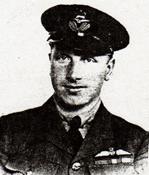John Alcock (pilot)
Sir John William Alcock KBE (born November 5, 1892 in Heaton Moor / Manchester , † December 18, 1919 in Rouen / France ) was a British pilot . Together with his navigator Arthur Whitten Brown , Alcock succeeded on 14/15. June 1919 the first non-stop flight across the Atlantic .
Life
John Alcock finished school in 1908 and initially worked in a motorcycle workshop. He was interested in flying and was hired as a mechanic in an aircraft factory. He learned to fly in 1911 and passed his pilot's exam on November 16, 1911. During the First World War he became a test pilot and flight instructor . In December 1916 he got into Macedonia in Turkish captivity. He was officially discharged from the army as a captain on March 10, 1919 .
In December of the same year he crashed on a flight to Paris near Rouen and died shortly afterwards of his injuries.
First non-stop transatlantic flight
John Alcock and Arthur Whitten Brown crossed in a Vickers Vimy on 14./15. June 1919 became the first people in a plane non-stop to the Atlantic , from West to East. The flight took off at 1:45 p.m. local time in St. John's , Newfoundland , and landed after 16 hours and 12 minutes of flight time near Clifden in Ireland after nautical miles flown in 1980 (3,667 km).
The flight was carried out with a specially converted Vickers Vimy bomber , which had been developed as a long-range bomber during the First World War. During the flight, Brown had to get out of the cockpit to free one of the two engines from the ice. Alcock and Brown won £ 10,000 on the flight for the first non-stop flight across the Atlantic, which the owner of the London newspaper Daily Mail , Lord Northcliffe , suspended in 1913 and renewed in 1918. On landing, the selected “green meadow” turned out to be part of a raised bog , the Derrygimlagh Bog , so that the wheels sank into the swamp and the machine turned on its nose. Alcock and Brown were unharmed.
Engine development was provided by Harry Ricardo , and the optimized aviation fuel was supplied by the Royal Dutch Shell Company by Robert Waley Cohen .
After the flight Alcock and Brown received in London by Winston Churchill handed over the prize money and were the next day of King George V as a Knight Commander of the Order of the British Empire to defeat Knight . Lord Northcliffe's remark that he saw it as a good sign for the future that the flight had started from one country in the British Commonwealth and ended in another - at a time when Ireland was intensely striving for independence - caused a scandal in Ireland out.
A memorial in Connemara , south of Clifden , commemorates the flight. The Alcock Island off the west coast of the Antarctic Graham Land is also named in honor of John Alcock .
Alcock and Brown's Vickers Vimy in St. John's , Newfoundland on June 14, 1919
Alcock and Brown's Vickers Vimy after landing at Clifden , Ireland on June 15, 1919
The front page of the New York Times June 16, 1919
See also
- R34 crossed the Atlantic as an airship non-stop in both directions.
- Lindbergh solo flight
- James Fitzmaurice
- Hermann Köhl, transatlantic flight from east to west
- Ehrenfried Günther Freiherr von Hünefeld, transatlantic flight from east to west
literature
- Our transatlantic flight: Sir John Alcock and Sir Arthur Whitten Brown. With an introd. by John Alcock , London: Kimber, (1969), ISBN 9780718302214
Web links
Individual evidence
- ↑ THE NEW DAILY MAIL PRIZES . In: The Royal Aero Club of the United Kingdom - official notices to members . April 5, 1913, p. 393 ( Flight Global Archive ).
- ↑ THE DAILY MAIL ATLANTIC PRIZE . In: The Royal Aero Club of the United Kingdom - official notices to members . November 21, 1918, p. 1316 ( Flight Global Archive ).
- ↑ Knights and Dames: A – BEC at Leigh Rayment's Peerage
| personal data | |
|---|---|
| SURNAME | Alcock, John |
| ALTERNATIVE NAMES | Alcock, Sir John William |
| BRIEF DESCRIPTION | British pilot, flew together with Arthur Whitten Brown on 14 / 15. June 1919 nonstop first in an airplane the Atlantic |
| DATE OF BIRTH | November 5, 1892 |
| PLACE OF BIRTH | Heaton Moor , Manchester |
| DATE OF DEATH | December 18, 1919 |
| Place of death | Rouen , France |




